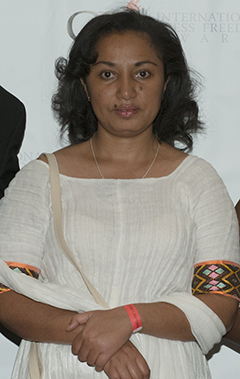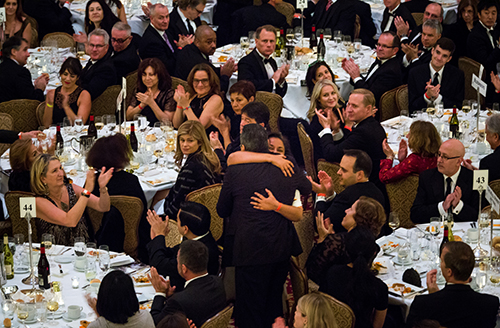Reeyot Alemu, an Ethiopian journalist who worked for the independent weekly Feteh, spent almost 1,500 days in prison after being arrested in June 2011 and charged with terrorism in 2012. She was released unexpectedly in July.
In interviews with CPJ in November and December, Reeyot discussed her experiences in prison, during which she was held for brief periods in solitary confinement and denied visits. She says she refused an offer of a pardon because it would have implied an admission of guilt. “They wanted me to kneel down, but I was not OK with that,” she said. “I think they wanted to release me, but they wanted me to say that I was wrong.”
Reeyot also discussed her decision to join Arbegnoch Ginbot 7, a coalition of opposition political organizations banned by the Ethiopian authorities. She announced her membership to the group in December, during an interview with Ethiopian Satellite Television Service in Washington D.C.
You were released unexpectedly on July 9. What did you think when you heard you were free?
I was confused. I didn’t ask for pardon and I did not fill out the parole form. I suspected they might take me to another police station or prison, or for torture. I said to the prison officers, “Maybe you say something false and if I reveal it, you will bring me back?” I think maybe they released me suddenly to avoid many people knowing about it. My sister had come for the release of [journalists] Edom [Kassaye] and Mahlet [Fantahun.] Fana Radio [a pro-government station] had announced their release. She didn’t know about me, because the media didn’t say anything. She wasn’t there for me, but she was very happy and excited.
What was it like in prison? Are you able to put those memories behind you?
I don’t think someone in prison can put the prison memories behind. I can’t and I also don’t want to because I must not forget. If I forget these kinds of things it’s not good for the struggle. There are many prisoners there, there are many who’ve been tortured there, there are many innocent people who don’t deserve to be in prison. Therefore I want to remember.
What were some of the things you experienced prison?
For 13 days while I was in the police station I was in solitary confinement, the room had a bad smell. No lawyer could visit me. They insult you. One day, one policeman crashed my head into the wall. These things can happen in that prison–in Maekelawi–you expect it. Also, they warn you, “If you won’t be a witness, we will detain you for life, or we can kill you.” They say this just to make you give false witness. And when I said “No,” they said, “OK, we can call you a terrorist,” and they did just that.

For the first three months, no one could visit me. The prison is very crowded but they wanted to isolate me from other prisoners. To be able to say that I was not isolated, they built another home for me and they put three other prisoners with me. There were four small beds, close to each other in a narrow room.
They even denied my right to read. When my parents or friends brought books [the prison authorities would] look at the title of the books or the cover and say “It’s politics or it’s history,” and return them. They want you to read these love stories [laughs] and to forget politics. They only wanted me to read books that they said should “entertain” me.
They denied my right to education. I was going to study my Masters in political science and when I was in prison I enrolled and paid my fees. They knew when I had paid and then after that, they denied me, as a kind of revenge.
[EDITOR’S NOTE: The Ethiopian embassy in Washington D.C. and the government spokesman in Addis Ababa did not immediately respond to CPJ’s request for comment on claims that political prisoners and jailed journalists are mistreated.]
What helped sustain you in prison?
I spent my days and nights reading, even if I didn’t get the books I am interested in. I took risks and was writing and smuggled them out. If I was not reading or writing, I was thinking about what we can do as a country, as a people. What must the people of Ethiopia do, including me?
I told myself I must be strong, I must pass these bad days. I told myself that some people survived Nazi camps and therefore I can too. You can’t be OK physically if they beat you, but I must keep my mental health. I also remember many people’s stories that I’d read before I was in prison–the ideas remain in my heart and soul. For example, Nelson Mandela, Malcolm X, Viktor Frankl, The Diary of Anne Frank. Her diary helped me realize I could also survive. There were also the poems of Bewketu Seyoum.
How did you get the news that the Zone 9 bloggers were arrested?
My mother and father told me when they were visiting. When I heard I became angry, but I also expected it. What is the future of Ethiopia, if someone tries to write something and they are arrested? What is the solution? I was very angry.
It must be frustrating to be so angry but not to be able to do anything.
That is the problem of being a prisoner [laughs]. If you are out, maybe you can speak or you can write something, but in jail, you can’t even do that. You feel even more bad when you are in prison.
While you were in prison did you know what CPJ and other groups were doing for you, or that you were part of CPJ’s Press Uncuffed campaign?
Not the details, but I knew some of it. I heard more when I came out. [CPJ] helps a lot. People or governments or organizations must know about the situation. You give awareness–that’s a big thing.
The world must know what the Ethiopian government is like. We [as journalists] are trying to be a voice for the voiceless, but when we were arrested, CPJ became our voice.
Now that you are free, what are your plans?
I will continue to write. After I was released, I began immediately to publish articles on Ethiomedia. I’m sure of two things: I will continue my writing and struggle against our government. It goes with writing.
Are you leaving journalism now that you’ve joined a political party?
I have no intention to stop journalism because I joined a political party. Journalism is a profession I am devoted to throughout my life. But I am also an Ethiopian and my country is in great danger. My country needs me. If I can do it through my beloved profession, I am happy and will continue. If the struggle needs me to contribute in other ways, I am also ready to do that. It depends on where I can contribute more to save Ethiopia from ruin.
What is your motivation for making this move?
I made this decision in the last two years of my imprisonment. I believe there is little opportunity for peaceful struggle. Within a week of parliament labeling five organizations as terrorists [in June 2011], the ruling party imprisoned me, Woubshet [Taye,] and other innocent citizens. After that many journalists, opposition party members, and leaders were accused under the anti-terrorism law. Ethiopia become a big prison for all dissident voices.
Many political parties have tried to change the government by peaceful means. By taking Martin Luther King Jr. and other leaders as role models, I was also part of a peaceful struggle. But in prison I realized the situation in Ethiopia is very different. To struggle against this government, there must be a political organization not controlled by the government. There must be a political party the government cannot shut down. There must be an armed group to respond to the cruelty of the regime in an appropriate way. As Mandela wrote in his autobiography, the struggle is defined by the oppressor, not the oppressed. I am forced to talk with the oppressors in the language they understand.
What is it about G7’s policy/position that made you join them?
I have many reasons to join Arbegnoch Ginbot 7. The main one is they are struggling for all Ethiopians–that means all ethnic groups, all religions, and all individuals.
What do you say to those who criticize you for abandoning your independence as a journalist to join a political party?
I ask them, “Why would I abandon my independence as a journalist?” For me, being independent is related to open-mindedness. I was and am ready to see beyond my religion, gender, ethnicity, and other things. I am ready also to see beyond my political party. I am curious enough to know about different ideas and groups. I think these and other qualities have enabled me to be an independent journalist. I have met with some people who have asked me these kinds of questions. Some of them mix being independent with being neutral. I cannot be neutral and stand between just and unjust, oppressors and oppressed. I am with oppressed ones and against the oppressors.
